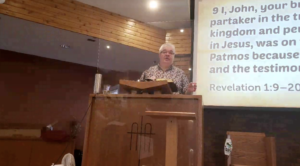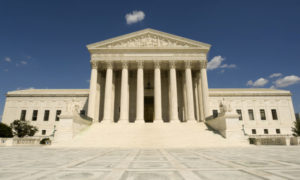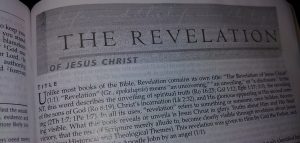Colossians 2
Remember that Paul wrote his letter to Colossae for entirely different reasons than he wrote his letter to Philippi. In his letter to Philippi, he was writing as friends. Paul likely planted that church himself and knew everyone there, having shepherded that particular gathering. He was just writing to his friends in free, stream-of-thought style. To Colossae, Paul is decidedly polemic in his approach, meaning that he was telling the believers there what the truth actually was to directly combat some false teachers and teaching that had arisen in the form of Gnosticism, which had four very basic categories:
- Philosophical heresy
- Ritualistic (or Judaic) heresy
- Visionary heresy (I have a dream…I have a vision…the Angel of the Lord said to worship blue potatoes…)
- Ascetic practices (remember, to the Gnostic, all matter is evil, and the only way to treat it is to punish it harshly)
Though friendly in tone, Paul’s matter-of-fact style of presentation would have been scandalous to the average Gnostic.
With that said, let’s continue with our study of Colossians.
———————————-
1: For I want you to know how great a struggle I have on your behalf and for those who are at Laodicea, and for all those who have not personally seen my face,
- Paul begins this chapter by speaking of the great struggle he has had for those in the area (remember, Laodicea was only a few miles away, and Hierapolis not a whole lot further) and for all those that had not met him personally. Remember last week in the quick overview we did I said that Paul actually had met a number of the saints there? This is a kind of a reference to that.
2: that their hearts may be encouraged, having been knit together in love, and attaining to all the wealth that comes from the full assurance of understanding, resulting in a true knowledge of God’s mystery, that is, Christ Himself,
- Paul is praying for the encouragement of the church at Colossae to be knit together by that divine, self-giving, self-sacrificing love [agape] and attaining the wealth [ploutos, it can be used literally to mean money or possessions, or figuratively to mean fullness, abundance, having plenty, or in a third way (here) a good with which one is enriched] that comes from a full understanding that results in a of the Mystery of God’s anointed One, Christ.
- Please note – this is NOT talking about money, this is more figurative language here. I have talked before about the “name it and claim it” false teachers that are only interested in feeding their own ego by getting you to give them your money for their own lusts. Paul was not in that category, and was speaking specifically about that mystery that God has revealed to the Church, about how Christ has redeemed us from the curse (context from chapter 1).
3: in whom are hidden all the treasures of wisdom and knowledge.
- Speaking of Christ, of course. [grin] Wisdom [sophia] and knowledge [gnosis]. Paul is building a polemic argument, which will become evident in the next verses.
4: I say this so that no one will delude you with persuasive argument.
- This will take him a couple of verses to lay the groundwork for it, but there are things we can notice. Paul is saying there is someone trying to delude [paralogizomai, to falsely reason, beguile, deceive] the Colossian believers. They were doing so with persuasive argument [pithanologia, logical arguments, not necessarily true]. I can give a comic example of what that means. The comic says to his straight man, Hey, I bet you ten bucks you aren’t here. The straight man reaches into his wallet to produce a ten dollar bill and holds it up. You’re on, he says. The comic begins his logic. Are you in Toronto? No. Are you in Chicago? No. Are you in Puerto Rico? No. Well, if you aren’t in Toronto, Chicago, or Puerto Rico, you must be someplace else, yes? Yes, okay… Well, if you’re someplace else, you can’t be here. With that, the comic grabs the ten-spot and walks off, leaving a very perplexed straight man. You all know the logic is false, but the comic still got away with ten dollars. Arguments are logical, but it doesn’t mean they are correct.
5: For even though I am absent in body, nevertheless I am with you in spirit, rejoicing to see your good discipline and the stability of your faith in Christ.
- Paul is telling the Colossian believers that he can see they are a stable group. Good discipline [orderly fashion] and stability [established, confirmed, steadfast].
6: Therefore as you have received Christ Jesus the Lord, so walk in Him,
- Paul’s bottom line was always that disciples of Christ would continue in Him. You started with Jesus justifying you – now continue with His sanctification in your life, which will ultimately lead to your glorification with him.
7: having been firmly rooted and now being built up in Him and established in your faith, just as you were instructed, and overflowing with gratitude.
- Firmly rooted [rhizoo, to cause to take root firmly]. The image is that of a plant. Psalm 1:1-3 says, “How blessed is the man who does not walk in the counsel of the wicked, Nor stand in the path of sinners, Nor sit in the seat of scoffers! But his delight is in the law of the Lord, And in His law he meditates day and night. He will be like a tree firmly planted by streams of water, Which yields its fruit in its season And its leaf does not wither; And in whatever he does, he prospers.” That’s just the beginning!
- Now being built up in Him and established [bebaioo, confirmed, strengthened, established] in your faith [pistis, that firm persuasion or opinion held about Jesus Christ]. So planted and securely rooted, then supplied that strength that confirms and establishes you in or by your faith in Jesus Christ.
- Just as you were instructed [didasko, taught, preached to, instructed]. That instruction may have come through people, but it was underpinned by the Holy Spirit, the paraklete, the helper that comes alongside, lifts and carries you to the other side [from chapter 1].
- And overflowing [perisseuo, to be over and above, to abound] with gratitude [eucharista, thankfulness, the giving of thanks]. The margin says this can be translated as, “…and overflowing in it with gratitude,” but I’m not sure how much actual difference that makes in my understanding, so just to point it out, and it is a minority manuscript, and only one manuscript at that.
- Manuscript information is important! If all the manuscripts, which by definition are hand-written copies as opposed to stuff from a printing press, say the same thing, we can know the historical copy work was good, and so we have what was written down. There is more archaeological evidence of this kind for the historical accuracy of the New Testament than there is for any ten pieces of English literature, counting all the works of William Shakespeare as one work. People that claim that the bible has been rewritten and changed by political views over time haven’t done their archaeological homework. Interpretations have changed, but not the text itself. We can talk more about that later if there is interest.
8: See to it that no one takes you captive through philosophy and empty deception, according to the tradition of men, according to the elementary principles of the world, rather than according to Christ.
- Paul begins his polemic. He implores the believers at Colossae not to be deceived [taken captive, the picture here is that of slaves led away by a conquering army] by philosophy [philosophia, the love or pursuit of wisdom] and empty deception [apate, deceit, lies]. These false philosophies are nothing more than man-made traditions, which Paul tells us are according to the elementary principles [stoicheion, so-called rules or elements of the natural world, laws, principles] of the world [kosmos, exactly what you think it means, the universe], rather than according to Christ. And this is really important, because of what follows. Next verse.
9: For in Him all the fullness of Deity dwells in bodily form,
- “Him,” from the context of the previous verse, speaks directly of Christ. In Him, Paul informs us, all the fullness [pleroma, a filling up, hence fullness] of Deity [tes Theotes, THE Deity, not A deity, KJV “Godhead”] dwells [lives or resides] in bodily form [somatikos, literally in the body].
- I’m saying a word here again because it came up last week. Charles Taze Russell (the founder of the Jehovah’s Witnesses cult) tried to make the scriptures say that Christ was not a part of Jehovah God and was merely a created being. No created being can hold all of the Deity in bodily form – except for this one, Jesus, who real Christians will tell you is Jehovah Jesus. And this is NOT the only place this can be done. I also thought it interesting that it’s the definite article that puts the lie to the line of thinking, but I’ll drop it and continue.
- Essentially, Paul is telling us that Jesus Christ is God made flesh and He walked among us.
10: and in Him you have been made complete, and He is the head over all rule and authority;
- In this Christ, the Deity in bodily form, we have been “made complete” [pleroo, made full, finished, amply supplied, accomplished, completed]. That verb “have been” is in what is called second person plural, referring to all of the believers, and this same Christ is the “head of all rule [arche, origins] and authority [exousia, the power to act, the guys who get things done]“ (margin).
11: and in Him you were also circumcised with a circumcision made without hands, in the removal of the body of the flesh by the circumcision of Christ;
- This is a reference to how humans had no part in this work. It was made without hands. It’s also how we know Paul is speaking of a symbolic circumcision, not an actual one (some forms of Judaistic Gnostic practice required circumcision for salvation – see Paul’s letter to the Galatians). This circumcision did not remove the covering of the foreskin from the creative center, but instead removed the “body of the flesh,” that is our old and selfish nature through the work of Christ. Wow, is this starting to sound familiar? Think of that circular representation I drew of you back in our study in Galatians, I had occasion to draw again in Ephesians, and again in Philippians – well, here’s an occasion to draw it yet again.
-
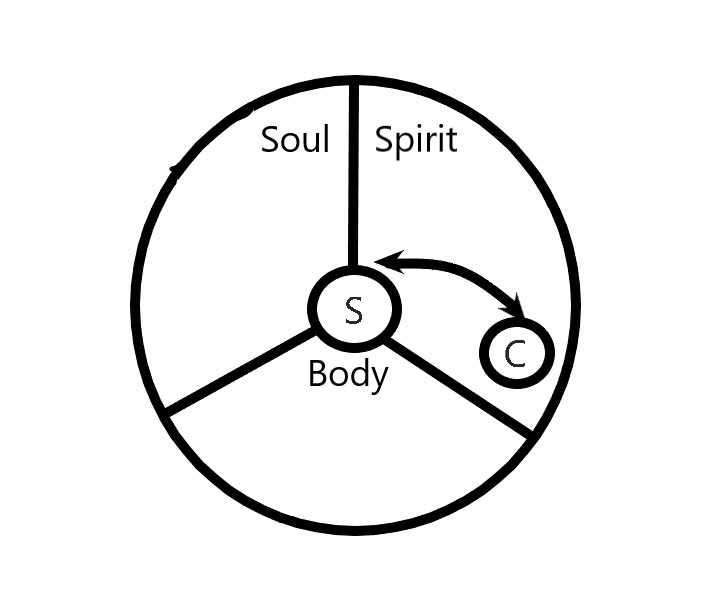

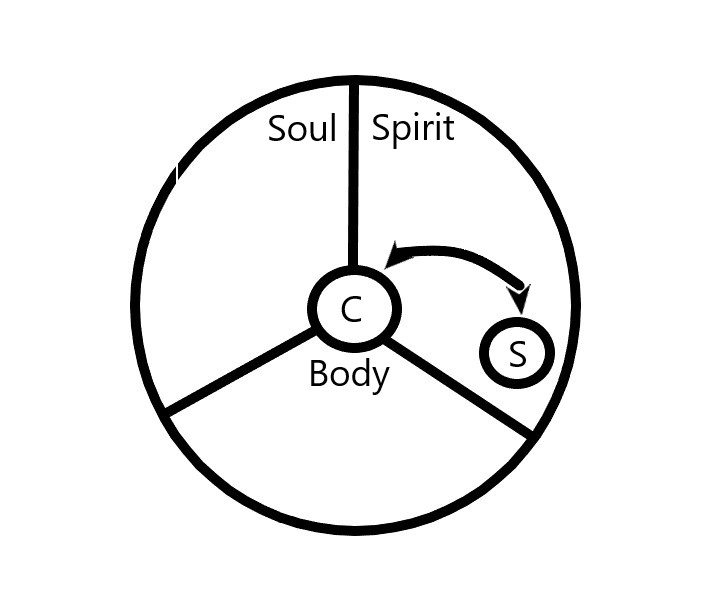
- Both of these represent the believer. But the image on the left is our old nature, where Christ is in our life (He makes our spirit alive or gives it New Birth, however you want to phrase it, but Christ is NOT the one in the center of decision making, something else (“S”) is. The image on the right is our new nature, and we must yield ourselves to Christ in our decision making by denying ourselves to gain it. This is best represented from Scripture by Galatians 2:20 – “I have been crucified with Christ; nevertheless, I live, yet not I, but Christ lives in me, and the life that I now live in the flesh I do so by faith in the Son of God who loved me and gave Himself for me.” This is that “circumcision of Christ” that Paul speaks of here in verse 11.
12: having been buried with Him in baptism, in which you were also raised up with Him through faith in the working of God, who raised Him from the dead.
- So what was buried with Christ in baptism? The old nature. And we were raised to newness of life in Christ. Baptism is not for our justification, remember. We are already redeemed and justified by God. This is always to do with our sanctification, which you will remember is the process by which our soul is saved and made holy so that we may see God. This process is best accomplished through struggle and trials in the lives of real believers, and will take the rest of your life.
- We can see this in our ceremony of baptism. The person is lowered into the water (symbolically burying the individual with Christ) and then raised from the water to signify they have chosen to walk in the newness of life that Christ gifted us with by His work on the cross. We don’t just leave them down there until the bubbles stop to make sure the devil really leaves!
13: When you were dead in your transgressions and the uncircumcision of your flesh, He made you alive together with Him, having forgiven us all our transgressions,
- And this puts the lie to all those that say we have any part to play in “earning” our own salvation. Christ did this when we were DEAD. What part can a corpse play in anything? Well, the part of the corpse. It can’t work, it can’t interact, it can’t act on its own to earn or qualify for anything – God must make it alive – and He did, and forgave, or pardoned (as opposed to paroled) us from our wrongdoings.
- Paul here is demonstrating that this is not a secret known to a few and has no special rites associated with gaining it. Everyone on earth has the same opportunity to be redeemed. Will everyone take it? No, sadly…but Christ’s substitutionary sacrifice was enough to pay for the sins of everyone, past, present, and future. He is willing to forgive – the question is will you respond to that drawing that God is sending to you?
14: having canceled out the certificate of debt consisting of decrees against us, which was hostile to us; and He has taken it out of the way, having nailed it to the cross.
- Paul is directly contradicting the Gnostic ascetics here. They felt that the only way they could deal with the wrongs that they committed and their sinful nature was to punish the body, the source of evil according to the Gnostic, and as severely as possible.
- Paul is saying that this man Jesus was God in bodily form, and He was our creator, and he is the one that dealt with our sin issues at the cross, where he became a substitute for us. Since the Gnostic believed all matter was evil, God could not have created it. Instead, we were created by angelic beings called Aeons, who should be worshipped instead, so that we could through them somehow bring ourselves closer to God. Paul, by way of contrast was telling them that God Himself dealt with our evil nature, and cancelled out our debt to God for our wrongdoings. That debt was hostile to us, and would have destroyed us if He had not taken it out of the way by nailing it to the cross when He was Himself nailed there.
15: When He had disarmed the rulers and authorities, He made a public display of them, having triumphed over them through Him.
- So much for your Aeons, says Paul. Christ not only disarmed them by His actions at the cross, He put them on public display as conquered foes, having won the fight with them through the Father’s power. And that has some practical applications for you, little Christs!
16: Therefore no one is to act as your judge in regard to food or drink or in respect to a festival or a new moon or a Sabbath day—
- Actually, I’ll take the next verse at the same time, they are very connected…
17: things which are a mere shadow of what is to come; but the substance belongs to Christ.
- Part of the false teaching that was creeping into Colossae was an attempt to make certain days more important than others. If you didn’t celebrate the feast of Wet, you would be left high and dry by those that were giving place to this kind of thinking. Now the source of this was likely the Jewish contingent that seemed to want to join and make everything about the new Way of Christ symbolically and thus authoritatively Jewish because, they explained, Jesus was a Jew. That’s all true, but Jesus also fulfilled the Law and put it away (according to Hebrews 7 and 8), and Paul was also wise to the game.
- The specific issues here were those of specifically food and drink, as well as certain days on the calendar that some felt needed to be recognized and observed, and that the Sabbath should be kept. However, Paul makes clear that such ritualistic observances are a “mere shadow” of what is to come, but the real meaning, the substance of the reality of these things belongs to Christ. I don’t think Paul was saying that we are fools to celebrate any holiday or do symbolic things. Christ Himself instituted the symbolic bread and wine at our communion (lit. sharing). This is meant to be a symbol of how Christ let Himself be broken for our sins, and how His blood paid the way for a New Covenant (contract) with God, whereby Christ is the High Priest of that faith. That symbolism actually comes from the Old Testament, as early as Abraham, when he met with Melchizidek, King of Salem, who was a priest of that same order – and its emblems were bread and wine, by the way. So I don’t think Paul is saying don’t use symbolism. I think he’s saying recognize the symbolism for what it is – a shadow and a type, meant to focus our attention on the real thing in Christ. He continues.
18: Let no one keep defrauding you of your prize by delighting in self-abasement and the worship of the angels, taking his stand on visions he has seen, inflated without cause by his fleshly mind,
- More of Paul’s necessary polemic here. “Let no one keep defrauding you” does not really give the sense I get from the Greek. The phrase here suggests that someone is cheating them out of their prize, but really I think it’s a follow-up from verses 16 and 17 – don’t let people judge you and thus move you away from truth. Don’t let them bully you away from your prize is the sense I get from the margin, the Greek text, and from the immediate context of the two previous verses. That phrase is all one Greek word, katabrabeueto, and it even sounds like a compound word. The prefix kata means to go against, and brabeueto can mean to direct, control, or rule. Heck, it even SOUNDS like our English word “browbeat” a little bit. So don’t let people bully you, or “browbeat” you away from the reality that is in Christ. This happens more than you think today. I could tell you stories, but I won’t. There are marks of this kind of behaviour, by the way…
- Self-abasement can also be translated “humility.” But if you’re reading the same phrase I am, it says “humility in the worship of angels,” (the word for and is not a conjunctive or joining word, but one that gives direction or qualification). Call it humility toward the wrong object if you like – that reveals it for what it is – idolatry, or fear of the wrong god. Sometimes they even name that god “Jesus,” but I don’t think we’re talking about the same fellow.
- Taking his stand on visions he has seen. Also can be translated as “going into great detail about.” And the word visions is in italics. Anybody want to help me out? What does a word in italics in our English text mean? [wait a moment] It means that the word is not in the original, it has been inserted by the translators to aid in our understanding of the meaning of the text. The guys at the NAS here have done a respectable job, because of the Gnostic opponents that Paul was addressing, but I think the meaning can be expanded from this just a little. How about “going into great detail of things he has experienced?” If that sounds a little charismatic, it kind of is, and I know what I’m talking about. I was saved in a Pentecostal church, after hearing the Gospel from a Charismatic former Catholic. Yet I end up in the “Reformed” theology camp. Heh. And they say there’s no God…
- Here is the real key – “inflated without cause by his fleshly mind.” inflated [phusioo, to be puffed up, margin renders “conceited”] without cause [eike, without cause, without reason, vainly] by his fleshly [sarx, of the flesh, remember, this is a phrase that means our old sinful nature] mind [nous, mind, understanding, reasoning].
- You know, reading this description, it is easy to see an actual believer that is walking after the flesh doing this because of things they want being met by this false teaching. I’m just saying.
19: and not holding fast to the head, from whom the entire body, being supplied and held together by the joints and ligaments, grows with a growth which is from God.
- Paul is simply saying that they are getting this all backwards. Marching orders and instructions for conduct should come from the Head of the Body (Christ, the Head of the Body, context verse 16 and from Chapter 1), not from “what I want,” which is the sad source of all false teaching that has ever existed. We must not be like these individuals, but instead must hold fast the Head! This is how the Body, the Church, will grow – as we hold fast to Jesus, not more liberal doctrines about how God loves everyone and has a wonderful plan for your life. You know, that’s true, God loves you and really has a wonderful plan for you from an eternal perspective. But what if that wonderful plan has a Roman colosseum and some lions in your future? Will you avoid it because of fear? Or will you trust the overseer and shepherd of your souls? It is only as we hold onto that connection to Jesus Christ, through our firm persuasion of How he became a man for us and redeemed us to God as our great substitute on the cross that we will grow personally or that our corporate gathering will grow in Christ. Wake up, Church!
20: If you have died with Christ to the elementary principles of the world, why, as if you were living in the world, do you submit yourself to decrees, such as,
- Look, if you are really saved, and you do really belong to Christ, and you’re really walking with Him, why are you letting these spiritual bullies run the show? Why are you doing what they say, even when, especially when, it contradicts Scripture? Paul is about to give some specifics. (“such as…”)
21: “Do not handle, do not taste, do not touch!”
- You know, this is how the so-called church (the Catholic one) kept people blinded for nearly a thousand years. “Do not handle” the Bible. You aren’t trained. You need to have the truth taught to you properly. THAT IS GARBAGE. You need to do your own homework and make up your own mind, even about what I am saying. To paraphrase a hero of mine, Dr. Chuck Missler, don’t listen to a word Gerry Brinkman says. Read it for yourself and reach your own conclusions. Develop your own faith.
- “Do not taste.” I’m going to read what Paul told Timothy about this in a private letter, specifically 1 Tim. 4:1-5: “ But the Spirit explicitly says that in later times some will fall away from the faith, paying attention to deceitful spirits and doctrines of demons, by means of the hypocrisy of liars seared in their own conscience as with a branding iron, men who forbid marriage and advocate abstaining from foods which God has created to be gratefully shared in by those who believe and know the truth. For everything created by God is good, and nothing is to be rejected if it is received with gratitude; for it is sanctified by means of the word of God and prayer.” To tell someone that they can or can’t eat something for religious reasons is specifically called the doctrines of demons.
- “Do not touch.” Same thing. I once had a brother tell me I shouldn’t be reading a certain Christian book because the leaders of the gathering hadn’t pre-approved it. Never mind that I had borrowed it from a Baptist Minister. Never mind that it was written by a very conservative theologian. Because a couple of guys that were put in charge by another guy, I wasn’t supposed to read it. (To be fair to the individual, he was 12 when he said that to me. But the point remains the same.) I am of the opinion that you should read everything and make up your own mind about it. Do not handle…why not? Will it hurt me? Will it try to eat me? Or are you just making stuff up to control me? Because that’s where garbage like this always gets started.
22: (which all refer to things destined to perish with use)—in accordance with the commandments and teachings of men?
- There is no actual power communicated by foods or items themselves. All of these things will end when they are used. The real problem here is something I was beginning to touch on in the previous verse: the commandments and the teachings of men. Men make stuff up to gain control of things and people. Why? To feel powerful, I suppose. It’s an illusion, really. Nobody ever has any power that God doesn’t allow them to have, and even that can be suspended or taken away. Paul was supernaturally released from prison once, but he was stoned for preaching the Gospel on multiple occasions. Everything he went through was allowed by the Father for some reason, and it all had to do with Paul learning how to walk with God in that specific circumstance, not to give artificial power to morons who think they know the truth better than you and therefore deserve to tell you what to do. Only Christ and the shepherd He puts over you have that authority, in reality, though it is good to practice humility, and to check your own will at the door of heaven. So whose commandment are you actually listening to? Again, wake up, church!
23: These are matters which have, to be sure, the appearance of wisdom in self-made religion and self-abasement and severe treatment of the body, but are of no value against fleshly indulgence.
- I’m sure these people have their reasons. I’m sure their reasons can be explained, and may even make some kind of sense. But if it involves making up your own or following their own made up belief system, if they are requiring you to submit to any authority other than Christ’s or His representative (that is the pastors or elders that Christ Himself has put over you for reasons of guiding you), or if they are requiring you to harm yourself or others in some ritualistic way, then it’s just plain wrong. And worse, it has no value to make you spiritually stronger. It cannot deal with your fleshly self-centered old nature. Only Christ can do that, and only christ SHOULD do that.
That’s the chapter for this week, so we’ll stop there for today.



